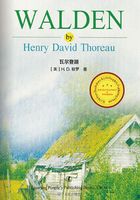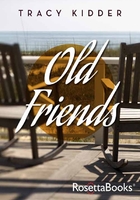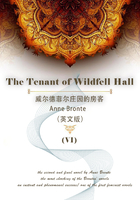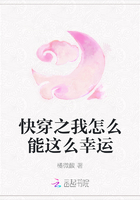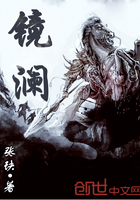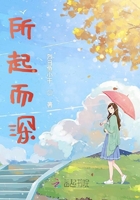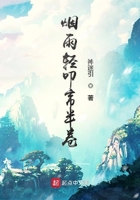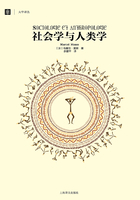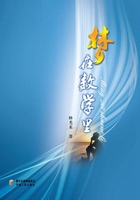PARADISE
(a) Having formed Man from dust, God planted a paradisal garden eastward of Eden and stocked it with trees, whose fruit were blazing jewels, among them the Tree of the Knowledge of Good and Evil. The river that flowed through Eden afterwards divided into four streams. Pishon waters the Land of Havilah where gold, carbuncle and onyx are found; Gihon waters Cush; Tigris runs beyond Assyria; and Euphrates is the fourth. God set Adam here, and permitted him to attend the Divine Assembly.[112]
(b) After Adam's expulsion, God appointed the Cherubim, also called 'the Flame of Whirling Swords', to guard Eden.[113]
(c) It is disputed where this terrestrial Paradise lies: whether in a desert,[114] or on the Mountain of God;[115] and whether westward or northward, rather than eastward, of Israel. A certain king of Judah once set himself to discover it. He ascended Mount Lebiah, from the summit of which could be heard the sound of whirling swords on the far bank of a river. Having lowered a number of his courtiers into the valley, he told them: 'Follow the sound!' But none came back.[116]
(d) Eden has seven gates,[117] and the outermost opens from the Cave of Machpelah at Hebron. Adam came upon it while burying Eve's body there. As he dug, a divine fragrance greeted his nostrils. He dug deeper, hoping to regain his lost abode, but a deafening voice cried 'Halt!'[118] Adam lies buried in the same cave; his spirit still guards the gate of Eden,[119] through which shines a celestial light.[120] The fragrance of Eden once so pervaded the neighbouring field, that Isaac chose it as a place of prayer.[121] For some twenty generations, it also clung to the garments of skin which God gave Adam, and which were handed down to his male descendants in the elder line.
Others claim that the outermost gate of Eden opens from Mount Zion.[122]
(e) The first man after Adam who entered Paradise alive was Enoch. He saw the Tree of Life, under whose shade God often rests. Its beauty of gold and crimson transcends all other things created; its crown covers the entire garden; and four streams—of milk, honey, wine and oil—issue from its roots. A choir of three hundred angels tends this Paradise—which some, however, say is situated not on Earth but in the Third Heaven. Isaac, the next man to visit it, studied there three years; and later his son Jacob gained admittance. Yet neither of these recorded what he saw.[123]
(f) Moses was taken to Eden by Shamshiel, its guardian angel, who among other wonders showed him seventy jewelled thrones made for the righteous and standing on legs of fine gold, ablaze with sapphires and diamonds. On the largest and costliest sat Father Abraham.[124]
(g) After Moses, no mortal was found worthy of Paradise except Rabbi Jehoshua ben Levi, a teacher of exceptional piety,[125] who entered by means of the following ruse. When he grew very old, God commanded the Angel of Death to grant him a dying wish; Jehoshua thereupon asked for a view of his appointed place in Paradise, but before they set out, side by side, demanded the Angel's sword—'lest, by some mischance, you may frighten me to death.' The Angel handed him the sword and, when they reached Paradise, set Jehoshua astride the boundary wall, saying: 'Look down! Yonder is your appointed place.'
Jehoshua then leaped from the wall, and though the Angel seized hold of his cloak, trying to haul him back, vowed that he would stay. When God's ministering angels complained to Him: 'This man has taken Paradise by storm,' He answered: 'Go and enquire whether Jehoshua ever broke a vow while in the world; if not, let him likewise be true to this one.' They went, enquired, and reported: 'He has kept every vow.' 'Then he shall stay,' God pronounced.
The Angel of Death, seeing that he had been outwitted, asked for his stolen sword. This Jehoshua withheld, well aware that the Angel could not enter Paradise. A divine voice then cried: 'Restore the sword for his needs!' Jehoshua answered: 'Lord, I will do so, if he swears never to draw it when You take a man's soul. Hitherto he has slaughtered his victims like beasts, even children in their mothers' bosoms.' The Angel renounced this savage practice, and Jehoshua gave him back the sword.
Thereupon Elijah commanded the righteous: 'Make room! Make room!' and Jehoshua, going farther into Paradise, saw God seated among thirteen companies of the righteous. God asked: 'Jehoshua ben Levi, have you ever beheld the rainbow?' He answered: 'Lord of the Universe, what person of my age has been refused this great sight?' God smiled and said: 'Are you not Jehoshua ben Levi?' For while a single truly pious man is alive on earth, the Rainbow no longer needs to remind God of His promise, made in Noah's day, that he would never again flood the whole world as a punishment of its wickedness. God knew that Jehoshua, not having seen a rainbow in all his life, had evaded this question to avoid the sin of presumption.
The Angel of Death then lodged a complaint against Jehoshua with the sage Gamaliel. Gamaliel said: 'Jehoshua did well! Now go back and tell him to survey Eden and its treasure houses, and make a report for me. Especially I wish to know whether there are Gentiles in Paradise, and whether there are Children of Israel in Hell.'
This mission the Angel of Death carried out; and Jehoshua reported to Gamaliel as follows: 'Paradise has seven gates, each leading to the next. The First House, facing the entrance, holds converts who came to God of their own free will. Its walls are crystal, its beams cedar, and Obadiah the righteous prophet rules over it.
'The Second House is similarly built, and holds the penitents of Israel. Manasseh ben Hizkiyahu rules over it.
'The Third House is of silver and gold. There grows the Tree of Life, under whose shade sit Abraham, Isaac and Jacob, the patriarchs of the twelve tribes, all those Israelites who went out of Egypt, and the whole generation of the Wilderness; also King David, his son Solomon as all the kings of Judah—except Manasseh, who lies in Hell. Moses and Aaron guard this house, which contains fine silver vessels, costly oils, couches, stools, canopies, and candelabra of gold, pearls and precious stones.
'When I asked: "For whom are these preserved?", King David answered: "For the righteous of Israel, dwelling in the world whence you came." And when I asked again: "Are any of Esau's descendants here?", he answered: "No, for if one such performs a good deed, God rewards him while he yet lives, but at the end he inherits Hell; whereas among the Children of Israel, every man receives his punishment while he yet lives, but afterwards wins a place in Paradise—unless he causes Israel to sin, as did King Manasseh."
'The Fourth House is built of gold, its beams are olive wood, and holds the righteous whose lives were bitter as the unripe olive.
'The Fifth House, through which Gihon flows, is built of silver, crystal, pure gold and glass. Its beams are gold and silver, and the fragrance of Lebanon pervades every hall. Here I saw silver and golden couches, sweet spices, with red and purple cloths woven by Eve; also scarlet yarn, and goat's hair braided by angels; and here dwell the Messiah son of David, and Elijah. When the Messiah asked me: "How do the Children of Israel spend their time in the world whence you come?", I replied: "In hourly preparation for your coming." At this he wept.
'The Sixth House holds those who have died while performing their duty to God.
'The Seventh House holds those who have died of grief for Israel's sins.'[126]
(h) Some say that the inhabitants of Paradise stand on their heads and walk on their hands; as do all the dead. If a sorcerer summons a dead spirit by conjuration, it always appears upside-down; unless summoned by order of a king—as the witch of En-Dor summoned Samuel at Saul's demand—whereupon it stands on its feet to show respect for royalty.[127]
(i) When Adam was expelled from Eden, God let him take away certain spices, namely saffron, nard, sweet calamus and cinnamon; also a few Paradisal seeds and cuttings of fruit trees, for his own use.[128]
Moses built the Tabernacle with wood fetched by Adam out of Paradise.[129]
***
1. For the origin of the Paradise concept common to Europe, the Orient, Central and North America, and Polynesia—see Chapter 12.
2. Adam's terrestrial Paradise, the Garden of Eden, was speculatively located first on the 'Mountain of God', Mount Saphon in Syria; next at Hebron, once the most fertile valley of Southern Palestine and famous for its oracular shrine; then at Jerusalem, after King David had moved his capital there from Hebron; and during the Babylonian captivity, at the head of the Persian Gulf—a delta watered by four main streams: Tigris, Euphrates, Choaspes, and the Pallakopas Canal. The wording of Genesis II. 8, 'God planted a garden eastward in Eden,' and 10, 'a river went out of Eden to water the garden,' made for geographical confusion. Some understood 'Eden' as the central part of the garden; others, as the region enclosing the garden. Further confusion persuaded some Babylonian Jews to identify Eden with Beth Eden (Amos I. 5; Ezekiel XXVII. 23), the Bit Adini of Assyrian inscriptions, which flourished in the tenth and ninth centuries B.C. Beth Eden lay in Armenia, the presumed source not only of the Tigris and Euphrates, but of the Nile—Alexander the Great held this view—and of the Orontes (Pishon?), which is the main river of Havilah (Northern Syria?), as the Nile is of Egypt (Cush). Josephus and the Septuagint (Jeremiah II. 18) equate the Gihor with the Nile. Some read Havilah as Central Arabia, though it lacks rivers; since Havilah appears in Genesis X. 7 as a son of Cush, and a descendant of Shem through Yoqtan.
3. Homer makes the same association of Paradise with rewards and punishments in the Odyssey (iv. 561), describing the Elysian Fields and 'the verge of the world where fair-haired Rhadamanthus rules, and life is easiest for man; no snow falls there, nor any violent storms, nor rain at any time, but Oceanus ever sends forth the clear, shrill blast of the West Wind to refresh mankind.' Rhadamanthus was one of the Infernal Judges. According to Josephus, the Essenes of the Dead Sea coast also believed that after death the righteous went to a Western region where they were untroubled by rain, frost or heat, but enjoyed continuous cool sea breezes. The wicked, however, were confined to a dark, chilly Hell, and there suffered endless punishment—as in the Greek Tartarus.
For the absence of all Esau's descendants from Paradise, see 38. 5 and 40. 3.
4. 'Mount Lebiah' means 'Mountain of the Lioness'. Its location is unknown. The two cherubim who guarded Eden with their whirling swords were probably swastikas (fire-wheels) painted on the gate as a warning to mankind that the garden lay under taboo.
5. Jehoshua ben Levi was head of the Lydda Rabbinic School during the early third century A.D., and hero of many edifying anecdotes.
6. The upside-down appearance of the dead is probably deduced from a view that ghosts assume a pre-natal posture in hope of re-birth (see 36. a, end).
7. A reference to what seems an older version of the Genesis Paradise myth occurs in Job XV. 7–8:
Art thou the first man that was born?
Wast thou brought forth before the hills?
Dost thou hearken in the council of Eloah?
And hast thou stolen wisdom for thyself?
According to this passage, Adam was born before the hills were formed, attended the Divine Assembly and, ambitious for still greater glory, stole wisdom—thereby doing of his own accord what, in the Genesis version, Eve and the subtle serpent persuaded him to do. His theft recalls the Greek myth of the Titan Prometheus who stole fire from heaven as a gift for mankind, whom he himself had created, and suffered fearful punishment at the hands of Almighty Zeus.

